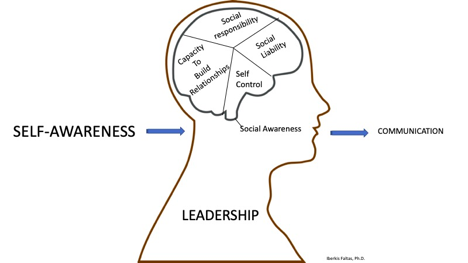In the heart of a successful leader or an effective communicator often lies a skill that is both deeply personal and universally impactful: self-awareness. At its core, self-awareness is the conscious understanding of one’s own character, emotions, desires, strengths, and weaknesses. It’s an introspective lens that when correctly focused, can bring clarity to both leadership and communication. Let’s dive deep into understanding its invaluable role in both realms.
Self-awareness in Leadership
Decision Making with Clarity: Leaders are often at the crossroads of making decisions that can steer the future of their organisations. Being self-aware enables leaders to make decisions that align with their core values and the strategic goals of the business. By understanding their inherent biases and preferences, they can make more balanced and considered decisions.
Enhanced Emotional Intelligence: Self-awareness is the cornerstone of emotional intelligence (EI). Leaders with high EI are adept at understanding and managing their emotions and are equally proficient in discerning and addressing the emotions of their team members. This emotional balance ensures stability, especially during challenging times.
Building Authentic Relationships: Authenticity is a powerful trait in leadership. Leaders who are self-aware resonate authenticity. They understand their strengths, openly acknowledge their weaknesses, and hence, are more approachable and relatable. This fosters trust and strengthens team cohesion.
Self-awareness in Communication
Understanding the Audience: Self-aware communicators know their style and preferences, but they also have an innate ability to sense and understand their audience’s needs and feelings. By understanding themselves, they become more attuned to reading others, making their communication more effective.
Clear & Assertive Messaging: Being aware of one’s emotions and biases enables communicators to convey their messages with clarity and confidence. Instead of getting swayed by the emotion of the moment, they choose words and tones that accurately reflect their intended message.
Feedback Reception & Adaptation: One of the often-overlooked aspects of communication is the ability to receive and adapt to feedback. Self-aware individuals are more open to feedback, understanding that it’s an avenue for growth. They listen actively, reflect on the feedback, and adapt their communication strategies accordingly.
Bridging the Two: Leadership Communication
Now, imagine the powerful convergence of self-aware leadership and communication. Leaders who communicate with self-awareness can:
Inspire and Motivate: They resonate a clarity of vision and purpose that inspires and aligns the team.
Resolve Conflicts: Understanding oneself and others allows for open dialogue, facilitating resolution and consensus.
Drive Change: With clarity of thought and purpose, they can effectively communicate change directives and ensure smooth transitions.
In today’s rapidly evolving world, where the dynamics of workplaces, teams, and markets are continuously changing, the compass of self-awareness becomes invaluable. It aids leaders in navigating the seas of uncertainty with assurance. Moreover, it empowers communicators to convey with clarity and conviction.




